GALLUP NEWS SERVICE
PRINCETON, NJ -- In the wake of national emergencies, the American public tends to rally around its government and leaders. In polling, this "rally effect" is typically indicated by a sudden increase in the president's approval rating, though often the president's ratings in other areas will increase as well. After the 9/11 terrorist attacks, for example, President George W. Bush's approval rating jumped 35 percentage points, from 51% to 86%, then reached a record high of 90% a week later. The effect is rarely permanent, although it is important to note that, while Bush's approval declined over the next 18 months, it did not fall as low as 51%, where it was just before 9/11.
After the Iraq war was launched in mid-March, Bush enjoyed another, though much smaller rally effect, with his approval rating going from 58% to 71%. While this 13-point jump is only about a third the size of Bush's rally effect after 9/11, it is nevertheless quite substantial and one of the largest ones in Gallup polling history. Still, the latest CNN/USA Today/Gallup poll finds that this latest surge has essentially dissipated -- Bush's presidential approval rating, his ratings on the economy and foreign affairs in general, his handling of the situation in Iraq, as well as his re-election standing among registered voters, are all back to pre-war levels.
The poll, conducted July 18-20, finds the current approval ratings of Bush all within a point or two of where they were just before the war was launched:
- His overall job approval rating is 59%, a point higher than before the war.
| George W. Bush's Job Approval Rating Before the Iraq War Until Now |
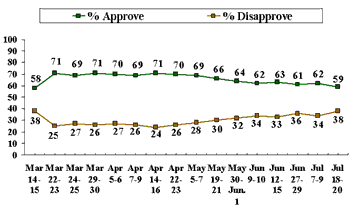 |
- His economy rating is 45% approve to 51% disapprove, virtually identical to the 44% to 52% rating found right before the war.
| George W. Bush's Job of Handling the
Economy Before the Iraq War Until Now |
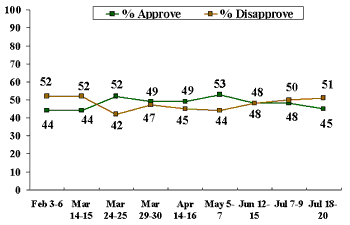 |
- On foreign affairs, 54% approve and 41% disapprove, compared with 53% to 43% before the war.
| George W. Bush's Job of Handling Foreign
Affairs Before the Iraq War Until Now |
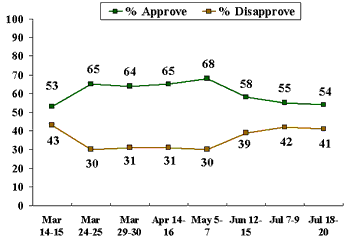 |
- Americans approve of his handling of the situation in Iraq by a 57% to 39% margin, almost the same as the 56% to 41% margin measured before the war.
| George W. Bush's Job of Handling Iraq
Situation Before the Iraq War Until Now |
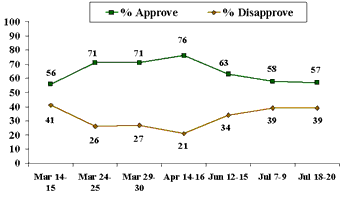 |
- Among registered voters, 46% say they would vote to re-elect Bush in 2004, while 42% say they would choose the Democratic candidate. Before the war, the comparable percentages were 45% to 42%.
Re-Election Chances
The first time Gallup asked the re-elect question about Bush was after the 9/11 terrorist attacks, in October 2001. At that time, he led the Democratic candidate among registered voters by 27 percentage points, 56% to 29%. The margin stayed in the double-digit range until 2003, when a February poll showed Bush leading by just 8 points, followed by the March poll showing a 3-point margin.
| Registered Voters: Are You More Likely to Vote For Bush or the Democratic Party's Candidate in 2004? |
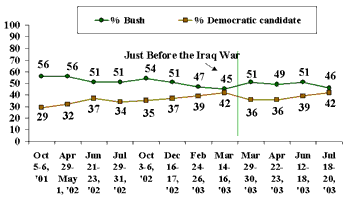 |
The jump in the graph in mid-March, from a 45% to 42% margin up to a 51% to 36% margin, represents the Iraq war rally effect. The current 4-point margin that Bush enjoys is only a point larger than what he enjoyed before the war.
The current findings highlight how volatile the public's views on these matters can be, and they serve as a warning to those who might try to predict the outcome of the 2004 election with more than a year to go.
Survey Methods
Results are based on telephone interviews with 1,003 national adults, aged 18+, conducted July 18-20, 2003. For results based on the total sample of national adults, one can say with 95% confidence that the margin of sampling error is ±3 percentage points.
In addition to sampling error, question wording and practical difficulties in conducting surveys can introduce error or bias into the findings of public opinion polls.
If George W. Bush runs for re-election in 2004, in general, are you more likely to vote for Bush or for the Democratic Party's candidate for president?
|
|
Democratic candidate |
OTHER |
No |
|
|
% |
% |
% |
% |
|
|
George W. Bush |
||||
|
National Adults |
47 |
41 |
3 |
9 |
|
(NA) 2003 Jul 18-20 |
||||
|
(NA) 2003 Jun 12-18 |
50 |
38 |
3 |
9 |
|
(NA) 2003 Apr 22-23 |
49 |
35 |
3 |
13 |
|
(NA) 2003 Mar 29-30 |
51 |
36 |
4 |
9 |
|
(NA) 2003 Mar 14-15 |
45 |
42 |
5 |
8 |
|
(NA) 2003 Feb 24-26 |
46 |
40 |
4 |
10 |
|
(NA) 2002 Dec 16-17 |
49 |
37 |
4 |
10 |
|
(NA) 2002 Oct 3-6 |
52 |
35 |
2 |
11 |
|
(NA) 2002 Jul 29-31 |
50 |
34 |
3 |
13 |
|
(NA) 2002 Jun 21-23 |
51 |
36 |
3 |
10 |
|
(NA) 2002 Apr 29-May 1 |
56 |
31 |
3 |
10 |
|
(NA) 2001 Oct 5-6 |
54 |
29 |
2 |
15 |
|
Registered Voters |
||||
|
(RV) 2003 Jul 18-20 |
46 |
42 |
3 |
9 |
|
(RV) 2003 Jun 12-18 |
51 |
39 |
3 |
7 |
|
(RV) 2003 Apr 22-23 |
49 |
36 |
3 |
12 |
|
(RV) 2003 Mar 29-30 |
51 |
36 |
4 |
9 |
|
(RV) 2003 Mar 14-15 |
45 |
42 |
5 |
8 |
|
(RV) 2003 Feb 24-26 |
47 |
39 |
4 |
10 |
|
(RV) 2002 Dec 16-17 |
51 |
37 |
3 |
9 |
|
(RV) 2002 Oct 3-6 |
54 |
35 |
1 |
10 |
|
(RV) 2002 Jul 29-31 |
51 |
34 |
3 |
12 |
|
(RV) 2002 Jun 21-23 |
51 |
37 |
3 |
9 |
|
(RV) 2002 Apr 29-May 1 |
56 |
32 |
3 |
9 |
|
(RV) 2001 Oct 5-6 |
56 |
29 |
2 |
13 |
|
George H.W. Bush |
||||
|
(NA) 1992 Jan 31-Feb 2 |
46 |
38 |
-- |
16 |
|
(NA) 1992 Jan 3-9 |
42 |
41 |
-- |
17 |
|
(NA) 1991 Dec 5-8 |
48 |
34 |
-- |
18 |
|
(NA) 1991 Nov 21-24 |
48 |
36 |
-- |
16 |
|
(NA) 1991 Oct 31-Nov 3 |
46 |
36 |
-- |
18 |
|
(NA) 1991 Oct 10-13 |
49 |
32 |
-- |
19 |
|
(NA) 1991 Sep 13-15 |
51 |
29 |
-- |
20 |
|
(NA) 1991 Sep 5-8 |
52 |
29 |
-- |
19 |
|
(NA) 1991 Aug 23-25 |
55 |
27 |
-- |
18 |
|
(NA) 1991 Jun 13-16 |
51 |
30 |
-- |
19 |
|
(NA) 1991 Apr 25-28 |
51 |
30 |
-- |
19 |
|
(NA) 1991 Mar 7-10 |
67 |
17 |
-- |
16 |
|
(NA) 1991 Feb 14-17 |
54 |
33 |
-- |
13 |
|
1991-1992 WORDING: If George Bush runs for re-election in 1992, in general are you more likely to vote for Bush or for the Democratic Party's candidate for president? |
||||
(vol.) – Volunteered response
